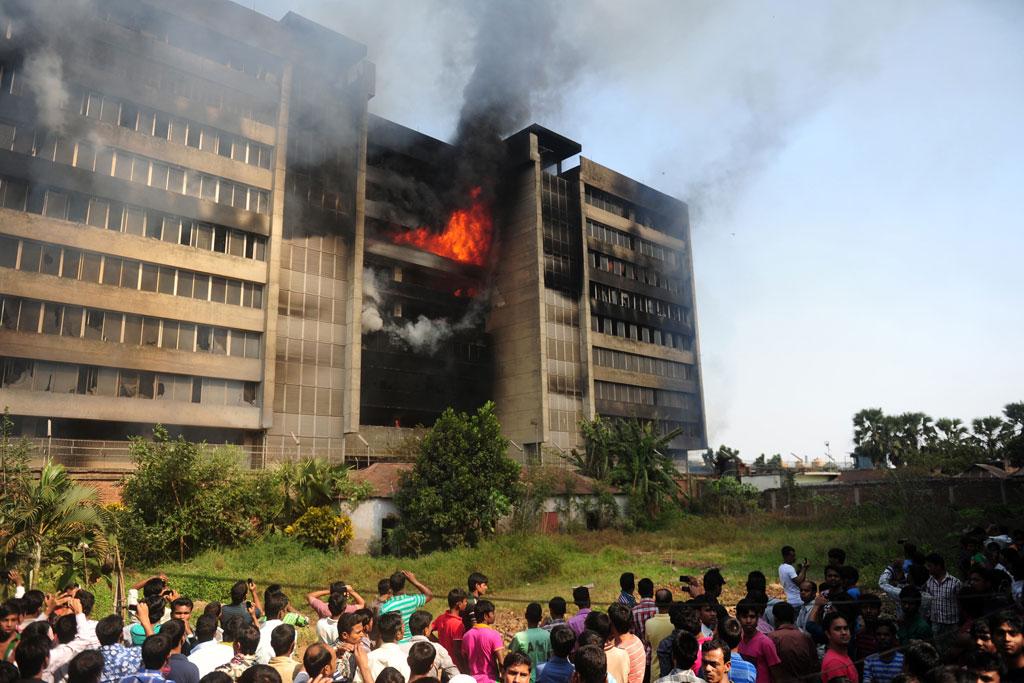Inspections of Bangladesh garment factories reveal overloaded ceilings, locked fire escapes
Bangladeshi bystanders watch as smoke and flames billow from a burning garment factory in the key garment manufacturing hub of Gazipur on the outskirts of Dhaka on Nov. 29, 2013.
Initial inspections of Bangladesh garment factories organized after the collapse of the Rana Plaza complex have found safety problems including overloaded ceilings, exposed cables and locked fire escapes, an industry-backed group said on Monday.
Working conditions in the $22 billion industry have been under scrutiny since the April, 2013 collapse of Rana Plaza in which more than 1,100 workers were killed. A November 2012 fire at another factory also resulted in 112 deaths.
Rana Plaza, the world's most deadly industrial accident since the 1984 Bhopal disaster in India, has prompted Western brands to pledge to cooperate to improve working conditions, but inspections of Bangladesh's 5,600 factories have been slow to get under way.
More than 150 clothing brands and retailers, including the world's top fashion chains Inditex and H&M, have joined the Accord for Fire and Building Safety in Bangladesh, which announced results of 10 initial inspections.
Brad Loewen, chief safety inspector for the Accord, said two factories had been temporarily closed in the last week after serious structural issues were uncovered, although work was allowed to continue after overloading was reduced.
"We have been getting great cooperation," Loewen told a webcast presentation ahead of the publication of the inspection reports planned in Dhaka on Tuesday. "We trust that will continue."
Rana Plaza was an eight-storey building sited on swampy ground without correct permits, where more than 3,000 workers — most of them young women — continued to labor even after cracks were noticed on pillars a day before the collapse.
Rock-bottom wages and trade deals with Western countries have helped make Bangladesh the world's second-largest garment exporter after China, with 60 percent of its clothes going to Europe and 23 percent to the United States.
Four contracted engineering firms and 25 staff engineers plan to inspect the 1,500 factories used by the Accord brands by the end of August, starting with the highest-risk buildings with more than five floors.
Safe environment
Among the issues uncovered in initial inspections, Loewen highlighted locks on fire exits, inadequate fire alarm and sprinkler systems, chaotic cabling and overladen buildings.
He showed a photograph of a ceiling beam visibly bowing under the weight of sacks of cotton stacked on the floor above, adding inspectors had ordered the load to be removed.
Factories are given two weeks' notice of an inspection, which monitors structural, fire and electrical safety.
"We're not trying to catch people out here. We're trying to create a sustainable, safe working environment," said Alan Roberts, Accord executive director of international operations.
Roberts said factory owners are responsible for paying to address safety issues raised by inspectors, although brands had agreed to help find funding if the owners cannot afford it.
The separate Alliance for Bangladesh Worker Safety, dominated by North American retailers like Gap and Wal-Mart Stores, said in October it had inspected more than half the Bangladesh factories its members use.
Proponents of the Accord say it is stronger than the Alliance as it requires independent inspections of work sites, binding arbitration enforceable in court in case of a dispute, and full disclosure of all suppliers, inspection reports and detailed quarterly reports.
Bangladesh has pledged to boost worker rights and recruit more safety inspectors after the European Union, which gives preferential access to Bangladeshi garments, threatened punitive measures. But the country has fewer than 200 qualified inspectors and government officials say it will take at least five years to check all factories.
Bangladesh has raised the minimum wage for garment workers and amended its labor law to boost worker rights, but industry leaders said not all factory owners have raised wages, while Human Rights Watch has said workers who try to form unions are being intimidated and threatened with murder.
(Additional reporting by Ruma Paul in Dhaka; Editing by David Holmes)
Every day, reporters and producers at The World are hard at work bringing you human-centered news from across the globe. But we can’t do it without you. We need your support to ensure we can continue this work for another year.
Make a gift today, and you’ll help us unlock a matching gift of $67,000!
